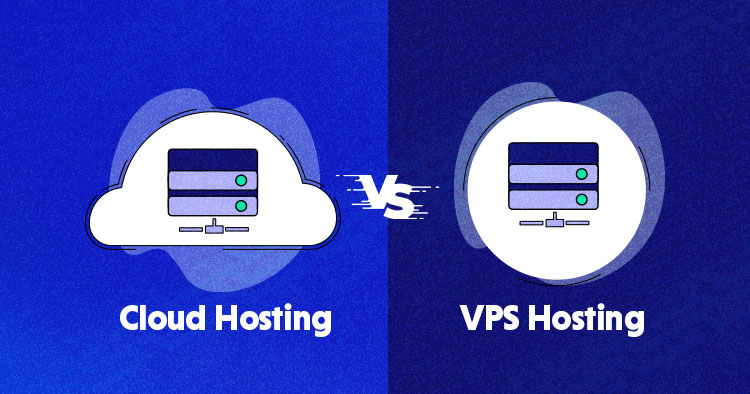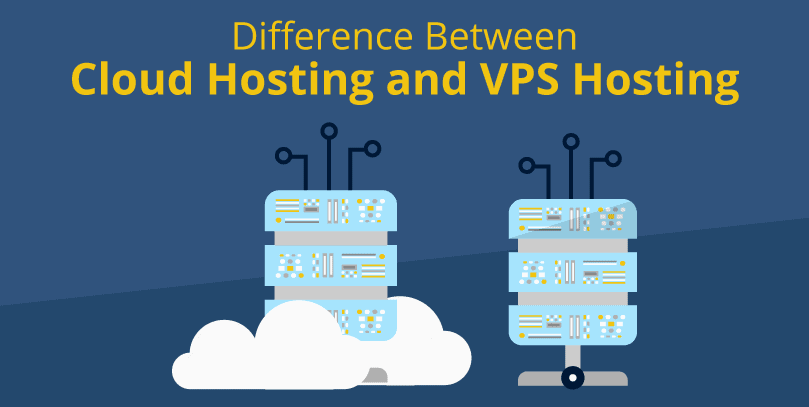Certainly! Virtual Private Servers (VPS) and Cloud Hosting are both popular choices for hosting websites and applications, but they have key differences in terms of infrastructure, scalability, management, and pricing. Hosting can seem a little (or a lot) complicated. You have cloud hosting, shared hosting, VPS hosting, and dedicated servers to consider. And you have dozens of hosting companies to choose from as well—all offering their own bells and whistles with the different plans they provide. There’s a lot of information to navigate, and you have to figure it out in the midst of making a number of other choices about your website.
To help, we hope to reduce that confusion by narrowing in on two different types of hosting: cloud hosting and VPS hosting to see how they compare. We’ll walk you through how the plans measure up to help you make an informed decision.

Table of Contents
Importance of Choosing the Right Type of Website Hosting
Selecting the appropriate type of website hosting is a critical decision that can significantly impact the performance, security, and success of your online presence. The importance of choosing the right hosting type extends to several key aspects:
Performance: The hosting type you choose directly influences the speed and responsiveness of your website. Opting for a hosting solution that aligns with your website’s resource requirements ensures optimal performance, contributing to a positive user experience.
Scalability: Your website’s hosting should be scalable to accommodate growth. The right hosting type allows you to easily scale resources up or down based on your evolving needs. This scalability is crucial as your website attracts more traffic or incorporates additional features.
Reliability and Uptime: The reliability of your hosting service directly affects the uptime of your website. Downtime can lead to lost opportunities and revenue. Choosing a hosting solution with high reliability and guaranteed uptime ensures that your website is consistently accessible to visitors.
Security: Security is a paramount concern for any website. The hosting type plays a vital role in safeguarding your data and protecting against cyber threats. A well-chosen hosting solution includes robust security features, such as firewalls, regular backups, and, in some cases, dedicated security measures.
Support and Management: The level of support and management offered by the hosting provider is essential, especially if you don’t have a dedicated IT team. Choosing a hosting type with reliable customer support and user-friendly management interfaces simplifies troubleshooting and routine tasks.
The importance of selecting the right type of website hosting cannot be overstated. It influences the core aspects of your online presence, from performance and security to scalability and cost efficiency. Taking the time to assess your website’s requirements and aligning them with a suitable hosting solution is a crucial step toward ensuring the success and sustainability of your online venture.
An Overview of VPS Hosting
VPS, an abbreviation for Virtual Private Server, is a hosting style where a single physical server is subdivided into multiple smaller virtual servers. Despite sharing the same physical server, each virtual server functions independently, essentially creating its own dedicated server environment.
With your distinct section of the server, you enjoy allocated resources exclusively for your use, allowing customization and configuration of your server partition to meet your specific requirements. Additionally, there is no sharing of data or file access between accounts on the VPS server.

Nevertheless, a potential drawback of VPS hosting is that the failure of a single physical server affects all VPS instances associated with it. Additionally, the performance of a VPS can be impacted if one site monopolizes resources on the physical server, although many hosting providers implement partitioning strategies to mitigate this risk.
An Overview of cloud Hosting
Cloud hosting entails your hosting plan utilizing a network of potentially limitless virtual machines, all of which rely on an interconnected network of physical servers. This arrangement makes cloud hosting akin to a large Virtual Private Server (VPS). The crucial distinction from a VPS plan lies in the distribution of resources across numerous physical machines, rather than a single server exclusively dedicated to your site.

In a cloud hosting environment, the utilization of multiple servers provides you with a more extensive pool of resources. This allows for easy scaling of your server’s power to meet fluctuating traffic demands. While cloud hosting offers greater flexibility compared to VPS hosting, it may not allow as much customization.
VPS Hosting vs Cloud Hosting in 5 Categories
Infrastructure:
- VPS: A VPS is a virtualized server created by partitioning a physical server into multiple virtual servers. Each VPS operates independently with its own operating system, resources (CPU, RAM, storage), and dedicated allocation of resources.
- Cloud Hosting: Cloud Hosting, on the other hand, is built on a distributed network of virtual servers that can be drawn from multiple physical servers and locations. It provides a more scalable and resilient infrastructure compared to traditional VPS.
Scalability:
- VPS: Scalability with VPS is limited to the physical constraints of the host server. If you need more resources, you might need to upgrade to a higher VPS plan, which may involve downtime during the migration process.
- Cloud Hosting: Cloud Hosting offers more scalability as resources can be easily scaled up or down on-demand. This is achieved by adding or removing virtual servers, allowing for seamless expansion without downtime.

Redundancy and Reliability:
- VPS: While VPS can be reliable, it may not offer the same level of redundancy as Cloud Hosting. If the physical server hosting the VPS fails, there may be downtime until the issue is resolved.
- Cloud Hosting: Cloud Hosting is designed for high availability. Resources are distributed across multiple servers and data centers, reducing the risk of downtime due to hardware failures. If one server fails, another can take over without disruption.
Management and Control:
- VPS: VPS hosting typically provides more control and customization over the server environment. Users have root access and can install custom software and configure the server to meet specific requirements.
- Cloud Hosting: Cloud Hosting often abstracts some of the underlying infrastructure details, providing a more user-friendly interface. While users still have control over their virtual servers, the level of customization may be more limited compared to VPS.
Pricing Model:
- VPS: VPS hosting usually follows a fixed pricing model where users pay a set amount for a predefined amount of resources. Upgrading to a higher plan involves a cost adjustment.
- Cloud Hosting: Cloud Hosting often follows a pay-as-you-go or a resource-based pricing model. Users are billed for the actual resources consumed, making it more cost-effective for variable workloads.
In conclusion, the choice between VPS and Cloud Hosting depends on your specific needs, technical expertise, and budget. VPS might be suitable for smaller-scale applications with predictable resource requirements, while Cloud Hosting is more suitable for scalable, dynamic workloads with a focus on high availability and flexibility.


